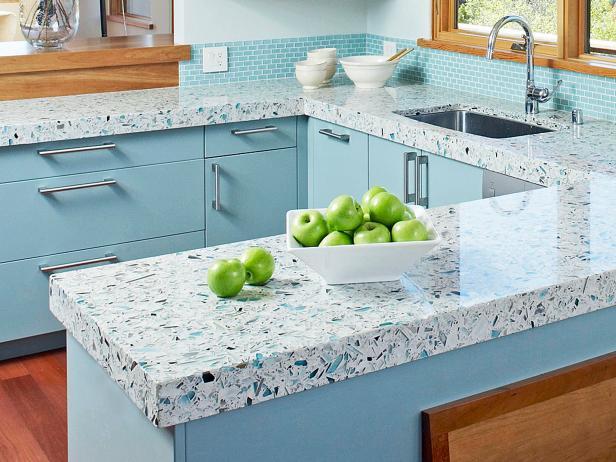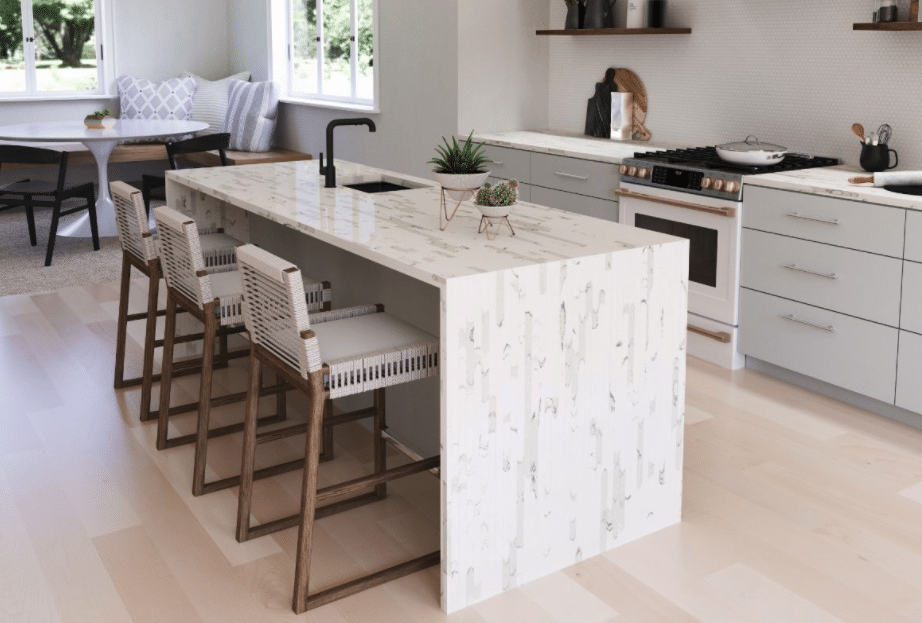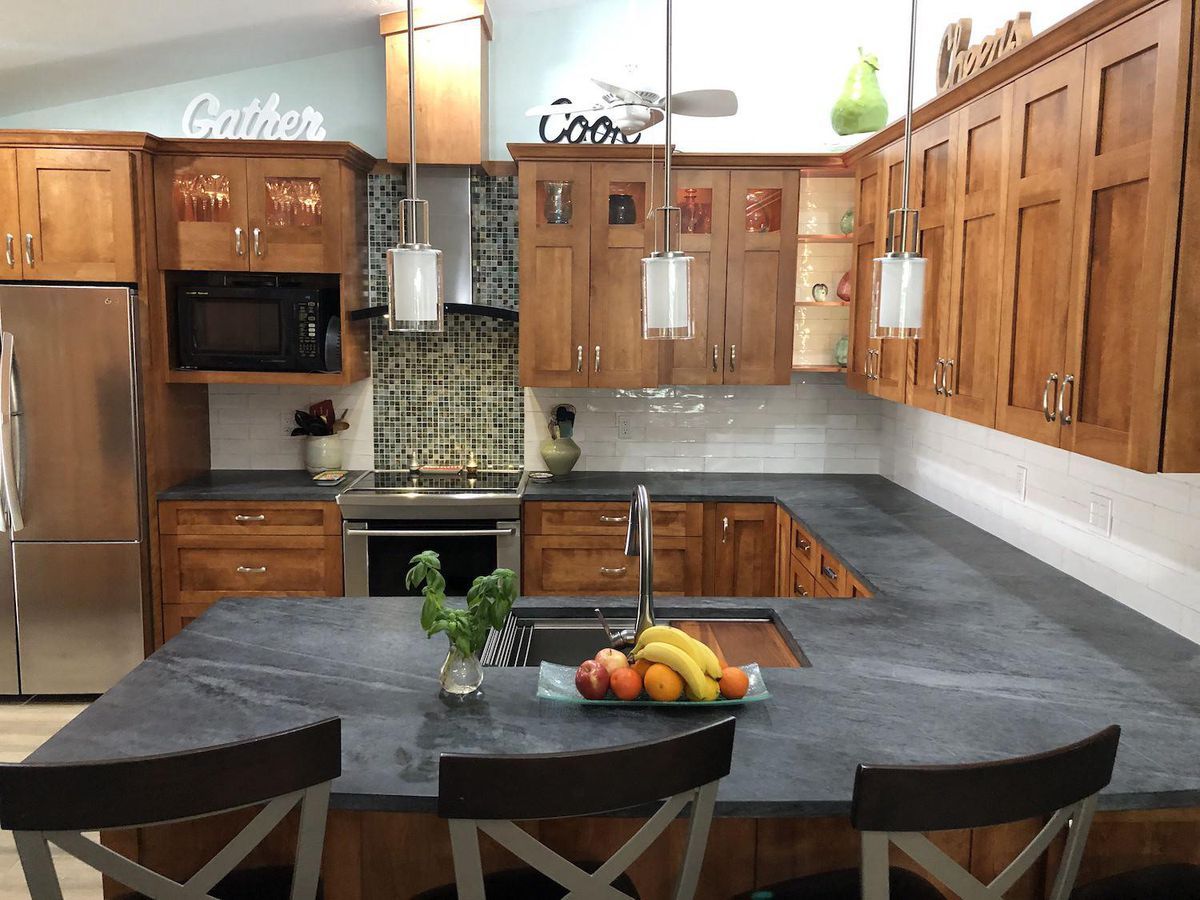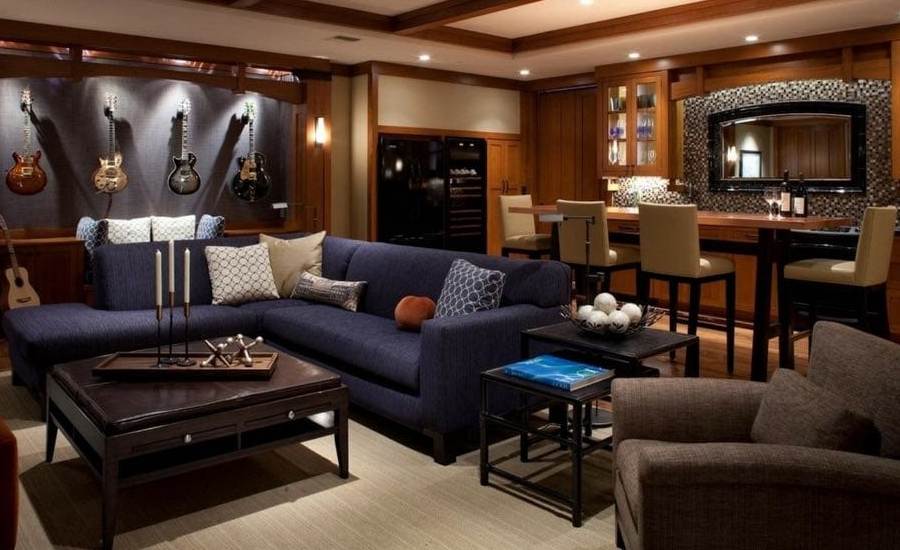One of the most important decisions you will make for your kitchen remodel is what type of countertop material you want to use. There are a variety of options available, and each has its own pros and cons. In this blog post, we’ll discuss some popular materials so that you can decide which one is right for you.
1. Granite Countertops
Granite countertops are one of the most popular materials for a kitchen’s countertop. It is very scratch-resistant, so it will last you many years without having to replace it like laminate or wood. You can also have your granite polished and sealed regularly, which helps maintain its appearance over time. This material usually costs more than other types of stone but, if properly maintained, has fewer upkeep needs in the long run.
The other benefit of granite is its sturdiness compared to most materials, so you don’t need to worry about damaging the countertop. It also doesn’t heat up or cool down as quickly as some types of stone do, making for a comfortable workspace at any time during the day.
The biggest downside with granite is if there are chips in your piece and they aren’t sealed properly, this can lead to discoloration over time. Also, note that this type of material does not work well near an open flame like a stovetop because it has low fire resistance properties.
2. Epoxy Countertops
Epoxy countertops are made by applying a layer of epoxy to the surface and then adding color through pigment. Epoxies have low VOC levels, provide good durability, and can be installed at any time during construction. In addition, they offer more design flexibility than other types of materials because they’re available in a wide variety of colors and patterns. The downside is that these options typically carry higher prices per square foot than most others on this list.
Another common drawback with epoxy countertops is their long cure times – which means installation must wait until after walls are drywalled so as not to interfere with drying paint and avoid bubbles under the coating due to humidity changes. Between application and install phase, it takes about a week to reach maximum hardness. If you plan to buy epoxy countertops, then you can read about this material more here.
3. Marble Countertops
Marble is one of the most expensive countertop choices. It can be difficult to install and maintain because it needs a sealant that should be reapplied every six months or so. Some people also find marble’s look to be too cold for their kitchen. Marble generally costs between $50 and $200 per square foot installed, depending on how much you buy at once and your location in the country.
4. Quartz Countertops
The popularity of quartz countertops has been steadily increasing in recent years, and for good reason. Quartz is a natural mineral composed primarily of silicon dioxide (SiO), one of the most abundant minerals on Earth. The word “quartz” comes from the German Quarz, which literally means “crystal,” as these rocks are usually colorless to white or gray crystal-shaped formations found all over the world. These crystals have a lovely, clean appearance that many adore. You should shop online at Qstone.cl to discover the best quality stone at the best price. You may browse our vast range of slabs and countertops for kitchen and bath, as well as fashionable and functional solutions to match your needs.
5. Soapstone Countertops
Soapstone countertops are often used in homes and restaurants because they are durable, low-maintenance, and aesthetically pleasing. The downside to soapstone is that the stone can scratch easily, which causes it to be less resistant than other materials. It also doesn’t hold heat very well, so cooking on a stovetop (especially with cast iron) may cause problems for those using soapstone as their counters.
6. Stainless Steel Countertops
Stainless steel is a material that resists stains, and it is popular for use in kitchens. Stainless steel countertops are also easy to clean because the surface does not absorb liquids or oils well. For this reason, stainless steel can reduce bacteria levels in kitchens when compared with other types of stone surfaces. In addition, some people prefer these counters because they do not require sealing like granite; however, both cost more than laminate countertops.
7. Ceramic Tile Countertops
Ceramic tiles are a good choice for people who want something easy to maintain and durable. They come in many colors, patterns, and finishes that can match any type of kitchen design or style. Ceramic tile countertops have an average lifespan of about 50 years, with low maintenance upkeep needed.
This is because they are made from natural materials rather than synthetic ones like plastic composite material would be. The only time the surface will need refinishing is when it has stains that cannot be cleaned off with regular household products. One drawback to ceramic tile counters is their lack of insulation properties which means you’ll likely notice a difference in temperature between the front and back sides of your stove due to heat coming up from below the stovetop being absorbed by the cold tile.
8. Laminate or Vinyl Countertops
Another type of countertop material is laminate or vinyl. Laminate counters are made from a thin layer of plastic with paper on each side which protects the surface when you’re cooking and prevents staining, scratching, and chipping. Vinyl has similar properties to laminate, but it’s thinner, so there is less chance for heat transfer through the top than ceramic tile would have.
However, both types can suffer from wear and tear as they age depending on how well taken care of they were by their previous owners, especially if used in high-traffic areas like kitchens where pots and pans are placed before being put into the dishwasher. One solution is to invest in a more expensive cabinet style rather than ones with open shelves to help shield the countertop from wear and tear.
9. Wooden Countertops
Wooden countertops are a green option. They’re made of sustainably sourced wood, and no two pieces will be the same. The best part is they can’t scratch or stain. Wooden counters also have natural antimicrobial properties, which means bacteria cannot thrive on them as easily as other surfaces might. Just make sure to seal your wooden counter before using it with food prep items like knives and cutting boards so that any spills don’t soak in too deep.
10. Concrete Countertops
Concrete countertops are made by mixing cement, sand, and water. The mixture is then formed into a slab or block that’s placed atop the kitchen island, sink – wherever you want to add some style. These counters come in all different shapes and sizes, so they’re sure to fit any space. Concrete can also be combined with other materials such as glass for additional design flair.
The Bottom Line
There you have it; the most popular types of countertops you will come across. Ensure that you choose the right material that aligns with your kitchen decor and budget.




















